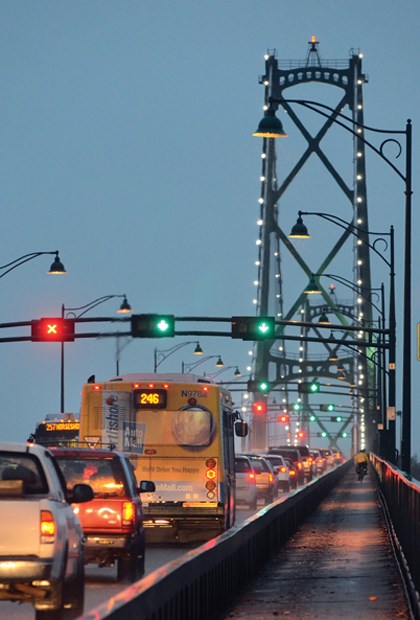Concerns over increasing gridlock and expanding monster homes took centre stage at the first West Vancouver council candidates' debate of the election season Wednesday.
The debate featured 12 candidates vying for one of six seats on council - as well as the endorsement of the West Vancouver Citizens for Good Government, who hosted the event at the Kay Meek Centre.
A tunnel under the Burrard Inlet is the only viable solution to easing the congestion that routinely ensnares commuters on the Lions Gate Bridge, according to retired MacMillan Bloedel executive Jim Finkbeiner.
"The rest of it is just dreaming, in my opinion," he said. "The three municipalities on the North Shore should get together and push Victoria.. .. Victoria takes us for granted because they know which way we're going to vote every time."
Coun. Craig Cameron advised against looking for a "big bang solution" to gridlock.
"It's very tempting to look to other levels of government and say, 'Well, they should fix the problem,' but the reality is in my lifetime there is no federal and provincial funding coming for a multi-billiondollar tunnel under Burrard Inlet," he said. "We can't even get them to kick in a one-third share each for our sewage treatment plant."
The traffic problem is acute, according to Coun. Bill Soprovich, who suggested more infrastructure is needed.
"We need more access, and if we don't get it, folks, we'll be held prisoner in our own community," he said.
Soprovich suggested working with the province and the Squamish Nation to put a bridge over the Capilano River.
"That's quite possible and it's something mayor and council should get on," he said.
While architect Peter Lambur advised West Vancouverites to get out of the car and take the bus, financial advisor Christine Cassidy suggested looking at the district's changing demographics.
"We are densifying at an inordinate rate," she said.
In addition to tackling density, West Vancouver's next council needs to regulate houses that are too big for their lots, according to Cassidy.
"We are infringing on the rights of our neighbours, we are jeopardizing their property values, we are stealing their privacy," she said. "We need to reduce the size of the houses that we are putting on our lots before we destroy the character of West Vancouver."
Editor of West Van Matters newsletter Carolanne Reynolds pointed to her previous work on council when she lobbied to reduce the size of West Vancouver homes relative to their lots.
Council needs to re-examine its policies, according to Reynolds, who noted that garages, accessory buildings, and some parts of basements are excluded from the district's calculations on housing size.
Council needs to help West Vancouver preserve its eroding esthetics, according to Lambur.
"We need plans for neighbourhoods by neighbourhoods," he said.
Lambur called for council to update its official community plan.
Both Finkbeiner and former councillor Michael Evison questioned the delays besetting the construction of the district's planned public safety building.
Construction of the $36-million facility was previously slated for early 2014, but the project has since been pushed back.
The situation is "astounding," according to Evison, who pointed to the project being tied up with the Grosvenor development on Marine Drive.
"If we don't get that right, we'll be stumbling around without a public safety building for many years to come," Evison said.
While she acknowledged disappointment surrounding the delay, council's priority should be in ensuring maximum efficiency in the public safety building, according to Coun. Mary-Ann Booth.
"It's got to last for the next 50 years so I'm prepared to wait another year to get it right," she said.
Booth also addressed the proliferation of vacant storefronts along Marine Drive.
Council needs to support a business improvement and marketing association, according to Booth, who also suggested re-examining the requirement of second floor office space, which she said may be a detriment to redevelopment.
For Finkbeiner, the problems in the area are mainly attributable to one cause.
"Fundamentally, I would say it's probably parking," Finkbeiner said.
Cassidy suggested the area needs a unified vision.
"We have property owners who are getting very large, lovely leases, and no real incentive to improve their buildings, so it looks tired," she said.
Cedardale PAC chairwoman Joanna Baxter broached the issue of waterfront development.
"I believe in a community that changes with our demographic ... I think there is room for some expansion," she said.
Coun. Nora Gambioli discussed council's call for a ban on liquefied natural gas tankers in Howe Sound.
With the deadline looming to contact the B.C. Environmental Assessment authority to ensure West Vancouver had a voice in the discussion, council made the right decision, according to Gambioli.
Asked if it was well thought out, she answered, "I would have to say yes, because it was me who made the motion."
Ali Mallakin, director of West Coast Biomedius, offered his thoughts on LNG tankers in Howe Sound.
"There is no essential danger from this technology," he said.
Max Clough advocated for a small emergency haven hospital in West Vancouver, which he suggested could be funded by private donations.



